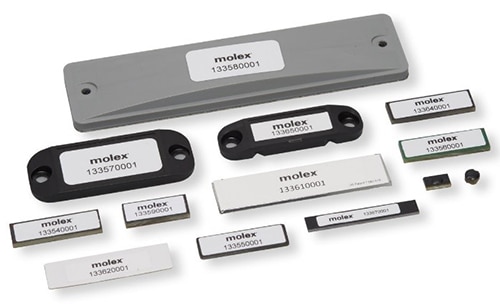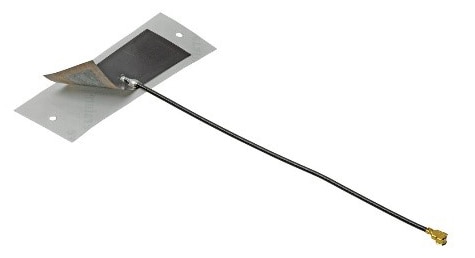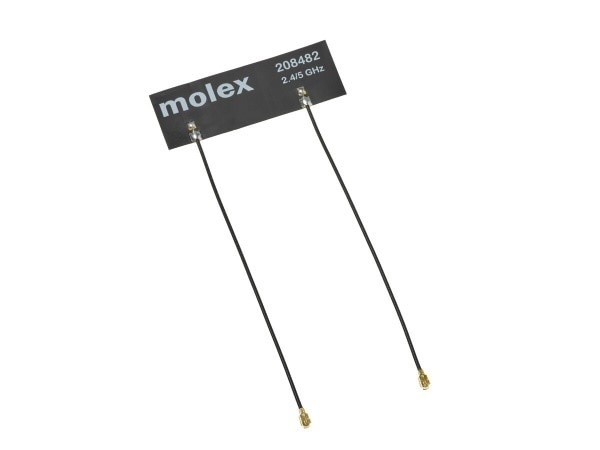Are You Ready to Move?
Improve Warehouse Logistics and Transportation with the Right Antenna
 (Image source: Molex)
(Image source: Molex)
The world is on the move.
The connected vehicle as part of the Internet of Things (IoT) is no longer the future; it’s the present. Service providers in the logistics industry have the chance to be among the first to reap the rewards of that connectivity, as they are already implementing technology in new use cases and business models that take full advantage of advanced wireless solutions.
From a macroscopic view, telecommunications are already embedded in everyday life. Practically all modern vehicles today are connected and exchanging information vehicle to vehicle and vehicle to infrastructure. Global market data, including information from Germany’s National Platform for Electric Mobility, shows that transportation fleets are making the switch to electric vehicles even faster than previously assumed. The future of connected vehicles is directly related to 5G development as the new mobile standard makes the vision of connected driving a reality.
 RFID Solutions (Image source: Molex)
RFID Solutions (Image source: Molex)
Behind the curtain is an antenna that allows device manufacturers to easily enable wireless communication. The right product will work in remote areas and handle a combination of Bluetooth/Wi-Fi, ultra-wideband (UWB), cellular IoT, LoRa, RFID, and NFC protocols.
 Ultra-Wideband Antenna (Image source: Molex)
Ultra-Wideband Antenna (Image source: Molex)
 WiFi Antenna (Image source: Molex)
WiFi Antenna (Image source: Molex)
Picking the Right Product
Many antennas are available as ready-to-use products and are a good fit for the most common applications. For more complex use cases, it’s important to have access to channels that allow your development teams and engineers working on prototypes to try different antennas to find the best fit for your application.
That trial-and-try-again approach is especially important for complex, interconnected and wirelessly connected environments such as warehouses, including the trucks and forklifts that operate in them. Molex offers complete packaged solutions combining multiple antennas in one device that can easily connect via cable with the telecommunications unit (TCU) of both vehicles and the infrastructure of a modern warehouse.
Mobile Experience Differentiates Antennas
When considering the right antenna for mobile applications, three factors should play into the decision:
- Experience in the mobile industry. Molex has been heavily engaged in the mobile industry for more than two decades, and now almost every mobile device dominating the market includes Molex know-how.
- Multiple options. Do you need ready-to-use or built-for-use products? There’s no one-size-fits-all in IoT, so go with a provider that offers options.
- Support. Detailed product and application specification literature on a vast array of antenna options makes it easy for any level of technician, at organizations from established companies to start-ups, to implement a Molex antenna in a wireless device design.
Software and Hardware Work Together
Software and hardware work together for route planning and optimization. Antenna components enable wireless communication hardware to track, monitor, and remotely control assets—either passively, like cargo, or actively, like interacting with a vehicle. The software will collect, process, and assess data to optimize procedures using artificial intelligence, and minimize waste through the entire value chain—from predictive maintenance to route optimization, and from automated rerouting of cargo to the optimization of loading units.
All assets already require complete wireless connectivity solutions that enable communication with different stakeholders of the infrastructure. Molex is leveraging deep domain expertise and experience in antenna design to create smart, compact, and powerful wireless products that include all necessary over-the-air connectivity enablers in a single package. See this Molex video, RFID Asset Tracking Solutions, for more information about this technology.
Selection Made Easy
These Molex solutions and more are readily available through DigiKey and are illustrated in the video below.

Have questions or comments? Continue the conversation on TechForum, DigiKey's online community and technical resource.
Visit TechForum








